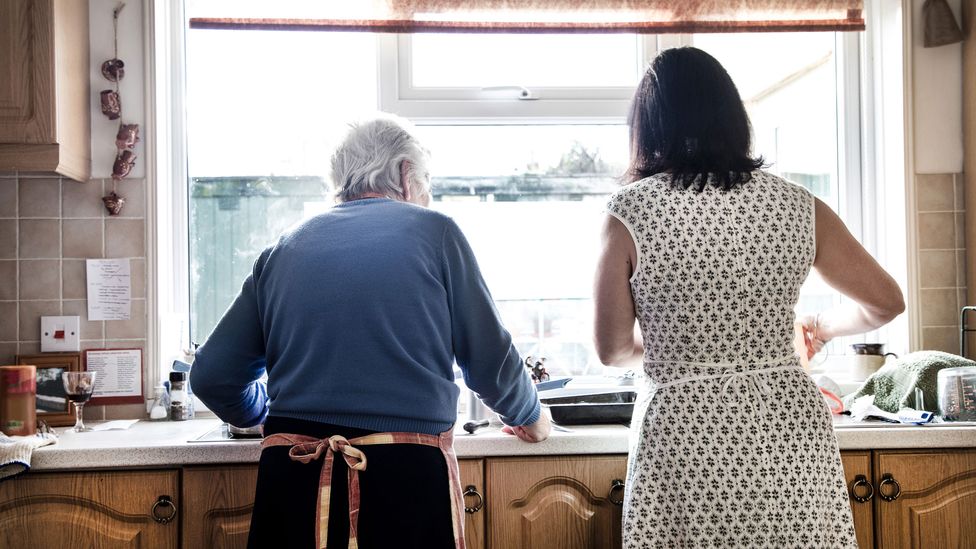Mom, Youre Not Going Out Tonight Family Therapy
The adult 'boomerang kids' moving home to their parents
(Image credit:
Getty Images
)

With costs of living increasing, a 'boomerang' menstruum of moving back in with parents could be the norm, not the exception, for people in their 20s and 30s.
I
In early March 2020, Sheridan Block, 30, had simply finished a year abroad in Marseilles, France, every bit a volunteer English teacher to refugees. She flew home to Jacksonville, Florida, to spend time with her maternal grandparents – her grandpa was recovering from wellness issues at the time. Her plan was to stay a few months to assist treat them while as well saving money, paying off some pupil debt and credit carte bills earlier returning abroad.
So, the pandemic hitting. "Information technology was kind of a spiral," says Block.
In exchange for living rent-free, she helped bulldoze her grandparents to appointments, ran errands, cooked and did chores around the house. She ended up staying most two years. "I was able to save enough money to pay off all those debts that I had, to finance a car so ultimately to movement out," she explains. Information technology was beneficial financially, she says, and good to be close to family, simply information technology required her to adjust her ideas of what adulthood should look similar.
Block is amid a growing group of 'boomerang kids' – developed children who return to their parents or grandparents' homes after moving out. This group of adults is on the ascension – and not just considering of the pandemic. In July 2020, 52% of young adults in the United states of america resided with one or both of their parents, according to a Pew Inquiry Center analysis – the highest percentage the United States has seen since the end of the Not bad Depression, in 1940. In the UK, the proportion of unmarried, child-complimentary xx-to-34-year-olds living with their parents went upward 55% betwixt 2008 to 2017, co-ordinate to research from Loughborough Academy.
In Western cultures particularly, moving away from domicile has traditionally been considered a crucial step in becoming an contained adult. Just as the number of boomerang kids continues to rise in countries such as the US, Britain and Canada, this may be set up to alter – and with it, our notion of what the stages of developed independence await like.
An upward boom
When she moved in with her grandparents, Cake noticed she was far from lonely amongst her peers.
"I found that a lot of friends, and fifty-fifty some dates I went on, were kind of in the same gunkhole," she says. "I had met one guy [on a date] who moved from San Francisco back in with his mom in Jacksonville. That's merely a reality at present, to practice whatsoever you've got to do to salve coin."

Later returning from education abroad in France, Sheridan Block, 30, moved back habitation with her family during the pandemic (Credit: Courtesy of Sheridan Cake)
Family Tree
This story is function of BBC's Family Tree series, which examines the issues and opportunities parents, children and families face today – and how they'll shape the world tomorrow. Coverage continues on BBC Time to come.
There are many reasons for young people to motion dorsum home, says Joanne Hipplewith, family unit therapist at the Institute for Family Therapy in London. The primary reason is the high price of living in major cities, though university tuition is another gene in the US and United kingdom of great britain and northern ireland.
"There is a tendency to staying at abode longer, considering everything is so expensive," says Hipplewith. Staying domicile, for many, means financial support from family equally they prepare for advanced degrees or starting a career. And it'south becoming increasingly normal: "[Young people are] prepared to go dorsum dwelling," says Hipplewith.
Though the 'boomerang' stage has been on the rising for at least the last decade, the pandemic has added a few new contributing factors: many who planned to go away for college could non – university campuses closed across the earth – and others who might accept otherwise moved for a job after college delayed leaving domicile because in-office work has not been bachelor.
For many, the boomerang phase is temporary. But information technology still may last many months – or even years, like information technology did for Block – to enable boomerangers to pay off pupil debt, save for a downwardly payment or establish themselves in a career without concurrently worrying most loftier rents, tuition and pupil debt.
"It'southward temporal – a one-twelvemonth, two-twelvemonth or five-twelvemonth plan," says Jenna S Abetz, associate professor of communication at the Higher of Charleston, United states of america. "This is just a transition chapter."
Redefining the milestones of machismo
For many, a return dwelling house afterwards living away – or straight after university – tin can feel similar a regression and loss of recently won independence.
"You learn to become an adult [in university]," says Hipplewith. "You take friends. Yous're doing what you want to exercise. And then, it can be really quite devastating because you're coming back under someone else's rules."
Boomeranging forces adults in their 20s and 30s to face assumptions near independence, and this tin come with anxiety. Beyond feeling they 'regressed' past moving home, many adult children returning home feel a trickle-downwardly effect to other life milestones. Abetz says that twenty- and 30-somethings living with their parents are getting married afterwards and also delaying having children, which can go out them feeling even more "behind".
"I expected something very dissimilar from adulthood," agrees Block. By her 30s, she says, she had one time idea she'd accept a successful career, own a abode, be married and accept a family, along with a solid savings and retirement plan. "Unfortunately, that didn't happen," she says. At times, living with her grandparents made her feel "like a failure not having those adulthood dreams checked off".
Still, at that place are benefits to boomeranging, say experts. Many of these adults are finding an increased power to do work they find meaningful, rather than have a task that simply pays the bills, says Abetz. During Covid-19, this has also meant some boomerangers have been able to choose jobs with lower risk factors, though this is largely dependent on their socioeconomic situation.
Socially, boomerang kids also have an opportunity to strengthen relationships with their parents at a fourth dimension when they typically would accept been establishing ties with new friends. It'south an unexpected "opportunity for mutual support and closeness with families," says Abetz, that could pb to boomerang kids developing stiff family unit support networks in the long-term. "Parents sometimes like to have kids back home for a lilliputian while," says Abetz. "They view that equally a special time they wouldn't necessarily have gotten."

For some boomerang kids, moving back in with their parents means delaying life milestones – but it can also bring them closer to their families (Credit: Getty Images)
Another new normal
Abetz and Hipplewith both believe this is not just a pandemic-induced tendency, and foresee an increasing number of adults bunking with parents as costs of living continue to rise. In the future, subsequently moving abroad for university or college, says Abetz, life paths may be a picayune "less linear. It might be dorsum and forth. It might be, after college, you lot'll exist habitation for six months or a couple of years".
Hipplewith hopes that as boomerang stages become more common in Western cultures, young adults volition feel less pressure to adapt to societal expectations of going to university, moving out and finding a job. Hipplewith encourages young people to view a render to habitation, or remaining home, as "informed decision-making". She says, "Let's move away or de-link becoming an adult with the human activity of moving away."
And some research indicates perceptions have already begun to modify. Block agrees boomerang moves are a new reality for her generation, and one that tin can potentially re-frame an unhelpful mindset.
"When I was traveling, my friends from other countries, specially those where family is super shut, like in Asia, would say how funny it was that Americans are then obsessed with moving out at xviii. Even my grandma, who is from the Philippines, would make comments about it," she says.
"I recall my generation is learning to be OK with the thought that non everyone's path is meant to await the aforementioned, and success is all about perception," continues Cake. "Adulthood is actually simply being old enough to have responsibilities and pay bills; that doesn't go away if y'all move in with parents again."
Source: https://www.bbc.com/worklife/article/20220208-the-adult-boomerang-kids-moving-home-to-their-parents
0 Response to "Mom, Youre Not Going Out Tonight Family Therapy"
Post a Comment